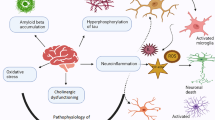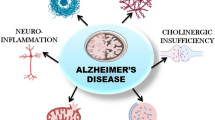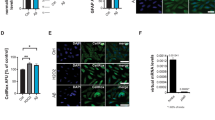Abstract
Chronic inflammation in the brain plays a critical role in major neurodegenerative diseases such as Alzheimer’s disease (AD), Parkinson’s disease (PD), and multiple sclerosis (MS). Microglia, the resident macrophages and intrinsic components of the central nervous system (CNS), appear to be the main effectors in this pathological process. Magnesium lithospermate B (MLB) is one of the major bioactive components of Radix Salviae miltiorrhizae, which has been documented to protect neurons against multiple types of neuronal injury. However, its functions on microglia and the related neuroinflammation remain unknown. In the present study, BV2 microglial cells were used to assess the anti-neuroinflammatory capacity of MLB. Our data show that treatment with MLB could not only suppress lipopolysaccharide (LPS)-induced proliferation and morphological changes, but also interfere with cell cycle progression in BV2 cells. More strikingly, it attenuated the production of the inflammatory mediator nitric oxide (NO) and a panel of pro-inflammatory cytokine in LPS-stimulated BV2 cells, including tumor necrosis factor-α (TNF-α), interleukin (IL)-1α, IL-1β, and IL-6, and also promoted a phenotypic switch from the M1 to the M2 phenotype. Additionally, an in vivo study showed that the administration of MLB could ameliorate lipopolysaccharide-induced neurodegeneration and microglial activation in the hippocampus of adult mice. Mechanistically, MLB blocked the activation of the NF-κB pathway upon LPS stimulation, indicating that the effects of MLB on microglia may be mediated by the NK-κB pathway. These results suggest the therapeutic potential of MLB as a novel anti-inflammatory and microglia-modulating drug for neurodegenerative diseases.







Similar content being viewed by others
References
Abmayr SM, Yao T, Parmely T, and Workman JL (2006) Preparation of nuclear and cytoplasmic extracts from mammalian cells. Curr Protoc Mol Biol Chapter 12 Unit 12:11.
Badshah H, Ali T, Kim MO (2016) Osmotin attenuates LPS-induced neuroinflammation and memory impairments via the TLR4/NFkappaB signaling pathway. Sci Rep 6(1):24493. https://doi.org/10.1038/srep24493
Benarroch EE (2013) Microglia: multiple roles in surveillance, circuit shaping, and response to injury. Neurology 81(12):1079–1088. https://doi.org/10.1212/WNL.0b013e3182a4a577
Boche D, Perry VH, Nicoll JA (2013) Review: activation patterns of microglia and their identification in the human brain. Neuropathol Appl Neurobiol 39(1):3–18. https://doi.org/10.1111/nan.12011
Bozic I, Savic D, Laketa D, Bjelobaba I, Milenkovic I, Pekovic S, Nedeljkovic N, Lavrnja I (2015) Benfotiamine attenuates inflammatory response in LPS stimulated BV-2 microglia. PLoS One 10(2):e0118372. https://doi.org/10.1371/journal.pone.0118372
Brown GC, Vilalta A (2015) How microglia kill neurons. Brain Res 1628(Pt B):288–297
Choi DK, Koppula S, Suk K (2011) Inhibitors of microglial neurotoxicity: focus on natural products. Molecules 16(2):1021–1043. https://doi.org/10.3390/molecules16021021
Dai XJ, Li N, Yu L, Chen ZY, Hua R, Qin X et al (2015) Activation of BV2 microglia by lipopolysaccharide triggers an inflammatory reaction in PC12 cell apoptosis through a toll-like receptor 4-dependent pathway. Cell Stress Chaperones 20(2):321–331. https://doi.org/10.1007/s12192-014-0552-1
Dutta G, Zhang P, Liu B (2008) The lipopolysaccharide Parkinson’s disease animal model: mechanistic studies and drug discovery. Fundam Clin Pharmacol 22(5):453–464. https://doi.org/10.1111/j.1472-8206.2008.00616.x
Gao F, Ding B, Zhou L, Gao X, Guo H, Xu H (2013) Magnesium sulfate provides neuroprotection in lipopolysaccharide-activated primary microglia by inhibiting NF-kappaB pathway. J Surg Res 184(2):944–950. https://doi.org/10.1016/j.jss.2013.03.034
H EH, Noristani HN, Perrin FE (2017) Microglia responses in acute and chronic neurological diseases: what microglia-specific transcriptomic studies taught (and did not teach) us. Front Aging Neurosci 9:227
Jiang F, Mao Y, Liu H, Xu P, Zhang L, Qian X, Sun X (2015) Magnesium lithospermate B protects neurons against amyloid beta (1-42)-induced neurotoxicity through the NF-kappaB pathway. Neurochem Res 40(9):1954–1965. https://doi.org/10.1007/s11064-015-1691-1
Jung YR, Kim DH, Kim SR, An HJ, Lee EK, Tanaka T, Kim ND, Yokozawa T, Park JN, Chung HY (2014) Anti-wrinkle effect of magnesium lithospermate B from Salvia miltiorrhiza BUNGE: inhibition of MMPs via NF-kB signaling. PLoS One 9(8):e102689. https://doi.org/10.1371/journal.pone.0102689
Kaneko YS, Ota A, Nakashima A, Nagasaki H, Kodani Y, Mori K, Nagatsu T (2015) Lipopolysaccharide treatment arrests the cell cycle of BV-2 microglial cells in G(1) phase and protects them from UV light-induced apoptosis. J Neural Transm (Vienna) 122(2):187–199. https://doi.org/10.1007/s00702-014-1256-5
Kopitar-Jerala N (2015) Innate immune response in brain, NF-kappa B signaling and cystatins. Front Mol Neurosci 8:73. https://doi.org/10.3389/fnmol.2015.00073
Lee M, Jantaratnotai N, McGeer E, McLarnon JG, McGeer PL (2011) Mg2+ ions reduce microglial and THP-1 cell neurotoxicity by inhibiting Ca2+ entry through purinergic channels. Brain Res 1369:21–35. https://doi.org/10.1016/j.brainres.2010.10.084
Lim JY, Sul D, Hwang BY, Hwang KW, Yoo KY, Park SY (2013) Suppression of LPS-induced inflammatory responses by inflexanin B in BV2 microglial cells. Can J Physiol Pharmacol 91(2):141–148. https://doi.org/10.1139/cjpp-2012-0242
Lynch MA (2009) The multifaceted profile of activated microglia. Mol Neurobiol 40(2):139–156. https://doi.org/10.1007/s12035-009-8077-9
Ma B, Hottiger MO (2016) Crosstalk between Wnt/beta-catenin and NF-kappaB signaling pathway during inflammation. Front Immunol 7378
Mattson MP (2005) NF-kappaB in the survival and plasticity of neurons. Neurochem Res 30(6–7):883–893. https://doi.org/10.1007/s11064-005-6961-x
Orihuela R, McPherson CA, Harry GJ (2016) Microglial M1/M2 polarization and metabolic states. Br J Pharmacol 173(4):649–665. https://doi.org/10.1111/bph.13139
Popiolek-Barczyk K, Mika J (2016) Targeting the microglial signaling pathways: new insights in the modulation of neuropathic pain. Curr Med Chem 23(26):2908–2928. https://doi.org/10.2174/0929867323666160607120124
Quan W, Wei G, Zhou D, Zhu Y, Guo C, Wang Y, Weng Y, Xi M, Wen A (2013) Magnesium lithospermate B reduces myocardial ischemia/reperfusion injury in rats via regulating the inflammation response. Pharm Biol 51(11):1355–1362. https://doi.org/10.3109/13880209.2013.791324
Ramirez AI, de Hoz R, Salobrar-Garcia E, Salazar JJ, Rojas B, Ajoy D, López-Cuenca I, Rojas P, Triviño A, Ramírez JM (2017) The role of microglia in retinal neurodegeneration: Alzheimer’s disease, Parkinson, and glaucoma. Front Aging Neurosci 9:214. https://doi.org/10.3389/fnagi.2017.00214
Salter MW, Stevens B (2017) Microglia emerge as central players in brain disease. Nat Med 23(9):1018–1027. https://doi.org/10.1038/nm.4397
Schmittgen TD, Livak KJ (2008) Analyzing real-time PCR data by the comparative C(T) method. Nat Protoc 3(6):1101–1108. https://doi.org/10.1038/nprot.2008.73
Song GJ, Suk K (2017) Pharmacological modulation of functional phenotypes of microglia in neurodegenerative diseases. Front Aging Neurosci 9:139. https://doi.org/10.3389/fnagi.2017.00139
Song W, Lu X, Feng Q (2000) Tumor necrosis factor-alpha induces apoptosis via inducible nitric oxide synthase in neonatal mouse cardiomyocytes. Cardiovasc Res 45(3):595–602. https://doi.org/10.1016/S0008-6363(99)00395-8
Suk K, Ock J (2012) Chemical genetics of neuroinflammation: natural and synthetic compounds as microglial inhibitors. Inflammopharmacology 20(3):151–158. https://doi.org/10.1007/s10787-011-0108-2
Tang Y, Le W (2016) Differential roles of M1 and M2 microglia in neurodegenerative diseases. Mol Neurobiol 53(2):1181–1194. https://doi.org/10.1007/s12035-014-9070-5
Varnum MM, Ikezu T (2012) The classification of microglial activation phenotypes on neurodegeneration and regeneration in Alzheimer’s disease brain. Arch Immunol Ther Exp 60(4):251–266. https://doi.org/10.1007/s00005-012-0181-2
Wang SX, LM H, Gao XM, Guo H, Fan GW (2010) Anti-inflammatory activity of salvianolic acid B in microglia contributes to its neuroprotective effect. Neurochem Res 35(7):1029–1037. https://doi.org/10.1007/s11064-010-0151-1
Xiang X, Poliakov A, Liu C, Liu Y, Deng ZB, Wang J et al (2009) Induction of myeloid-derived suppressor cells by tumor exosomes. Int J Cancer 124(11):2621–2633. https://doi.org/10.1002/ijc.24249
Xiao G, Hu W, Chen X (2013) Magnesium lithospermate B protects neurons from N-methyl-D-aspartic acid injury and attenuates kainic acid-induced neurodegeration in FVB mice. J Mol Neurosci 51(2):550–557. https://doi.org/10.1007/s12031-013-0023-7
Xu L, He D, Bai Y (2016) Microglia-mediated inflammation and neurodegenerative disease. Mol Neurobiol 53(10):6709–6715. https://doi.org/10.1007/s12035-015-9593-4
Yang ZB, Luo XJ, Ren KD, Peng JJ, Tan B, Liu B, Lou Z, Xiong XM, Zhang XJ, Ren X, Peng J (2015) Beneficial effect of magnesium lithospermate B on cerebral ischemia-reperfusion injury in rats involves the regulation of miR-107/glutamate transporter 1 pathway. Eur J Pharmacol 766:91–98. https://doi.org/10.1016/j.ejphar.2015.09.042
Yu HM, Zhao YM, Luo XG, Feng Y, Ren Y, Shang H et al (2012) Repeated lipopolysaccharide stimulation induces cellular senescence in BV2 cells. Neuroimmunomodulation 19(2):131–136
Zhang J, Xie X, Tang M, Zhang J, Zhang B, Zhao Q et al (2017) Salvianolic acid B promotes microglial M2-polarization and rescues neurogenesis in stress-exposed mice. Brain Behav Immun pii S0889-1591(17):30219–30212
Acknowledgements
All authors thank Dr. Jeffery Zheng, Aardvark Therapeutics Inc., and Ms. Rebekah A. Burdyshaw, Cleveland State University, for their critical proofreading of the manuscript.
Author information
Authors and Affiliations
Corresponding author
Ethics declarations
The animal study protocol was approved by the animal ethics committee of the corresponding author’s institution. All animal care and use were performed in accordance with institutional guidelines.
Conflict of Interest
The authors declare that they have no conflict of interest.
Rights and permissions
About this article
Cite this article
Tai, Y., Qiu, Y. & Bao, Z. Magnesium Lithospermate B Suppresses Lipopolysaccharide-Induced Neuroinflammation in BV2 Microglial Cells and Attenuates Neurodegeneration in Lipopolysaccharide-Injected Mice. J Mol Neurosci 64, 80–92 (2018). https://doi.org/10.1007/s12031-017-1007-9
Received:
Accepted:
Published:
Issue Date:
DOI: https://doi.org/10.1007/s12031-017-1007-9




